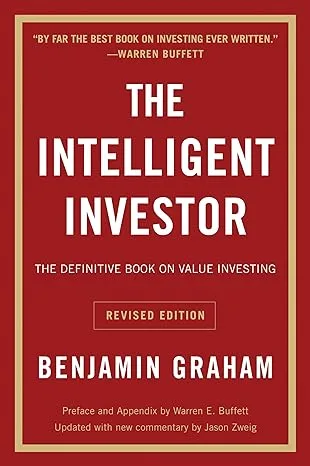Stock Market Books that You Must Read.
The Intelligent Investor
by Benjamin Graham
When it comes to investing, few books have stood the test of time like The Intelligent Investor by Benjamin Graham. First published in 1949, this classic remains a must-read for anyone looking to build wealth through smart, disciplined investing. Whether you’re a seasoned investor or just starting out, Benjamin Graham’s wisdom offers invaluable insights that can help you navigate the often unpredictable world of stocks and bonds.
In this book review, we’ll dive into why The Intelligent Investor is considered the bible of value investing, explore its key lessons, and discuss how Benjamin Graham’s principles remain relevant in today’s fast-paced financial markets.

Who Was Benjamin Graham?
Benjamin Graham, often referred to as the “father of value investing,” was a renowned economist and professional investor. His investment philosophy emphasized thorough analysis, minimizing risk, and focusing on the intrinsic value of a company rather than market trends. Graham’s teachings have influenced some of the most successful investors of all time, including Warren Buffett, who famously called The Intelligent Investor “the best book on investing ever written.”
Graham’s approach to investing is rooted in patience, discipline, and a long-term perspective. He believed that the stock market is often driven by emotions, creating opportunities for intelligent investors to buy undervalued stocks and sell them when they reach their true worth.
Why The Intelligent Investor is Still Relevant Today
Despite being written over 70 years ago, The Intelligent Investor remains incredibly relevant in today’s financial landscape. The principles of value investing, margin of safety, and emotional discipline are timeless and apply to both traditional and modern markets. In an era of meme stocks, cryptocurrency hype, and rapid trading, Graham’s teachings serve as a grounding force for investors.
Moreover, the book’s emphasis on thorough research and analysis is more important than ever. With the rise of online trading platforms and access to vast amounts of financial data, investors have the tools to make informed decisions—if they’re willing to put in the work.
Pros
- Offers timeless insights on investing, emphasizing long-term strategies over quick gains.
- Teaches investors how to minimize losses and maximize sustainable gains.
- Advocates for emotional control, guiding investors to reach their full potential.
- Emphasizes the importance of estimating a stock’s value based on key parameters like company prospects and management quality.
- Distinguishes between active and passive investing approaches, catering to different investor preferences and temperaments.
- Encourages a disciplined, prudent investment approach, including regular portfolio diversification and dollar-cost averaging.
Cons
- Despite its acclaim, many investors fail to adhere to its principles, leading to repeated market bubbles and crises.
- Requires discipline and patience, which may not appeal to those seeking quick profits.
- Some readers may find the emphasis on long-term investing to be overly conservative.
- The book’s focus on fundamental analysis may not fully address the complexities of modern market dynamics.
- Implementing its strategies may require significant effort and diligence, deterring some investors.
- This book may not be recommended for individuals new to investing.




